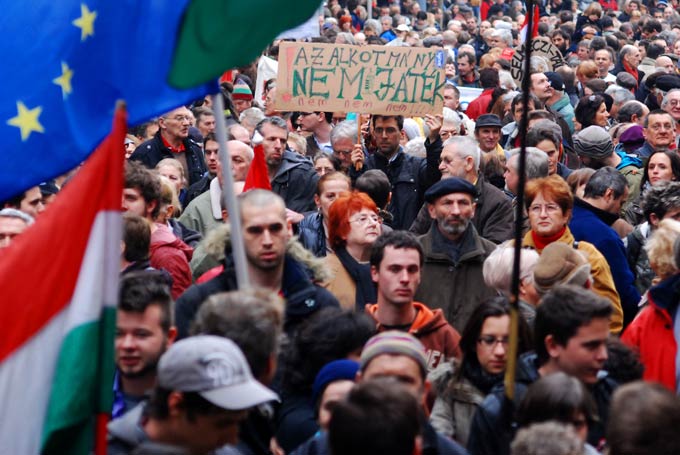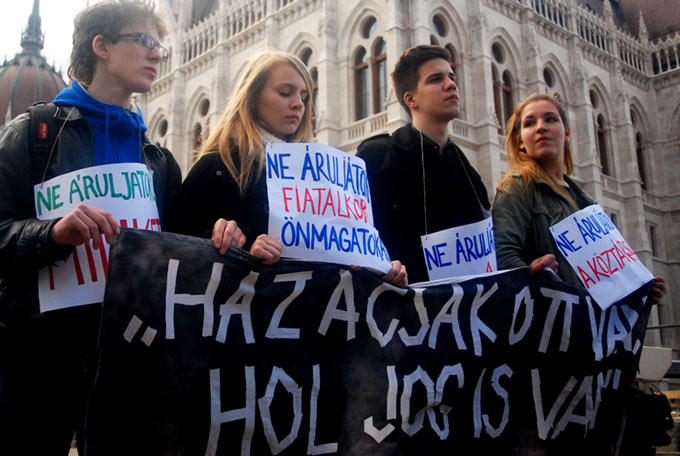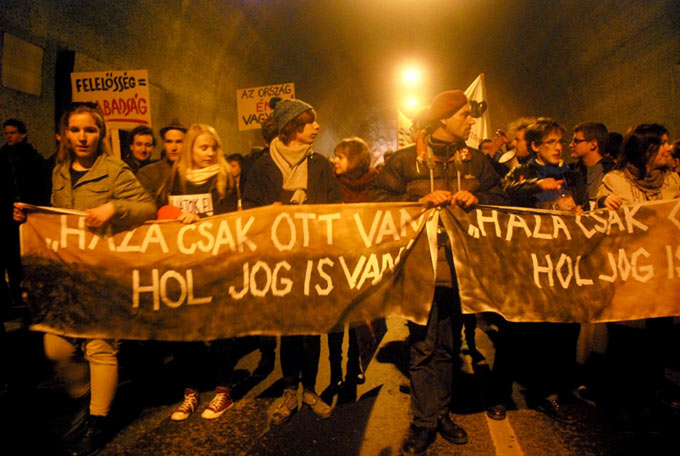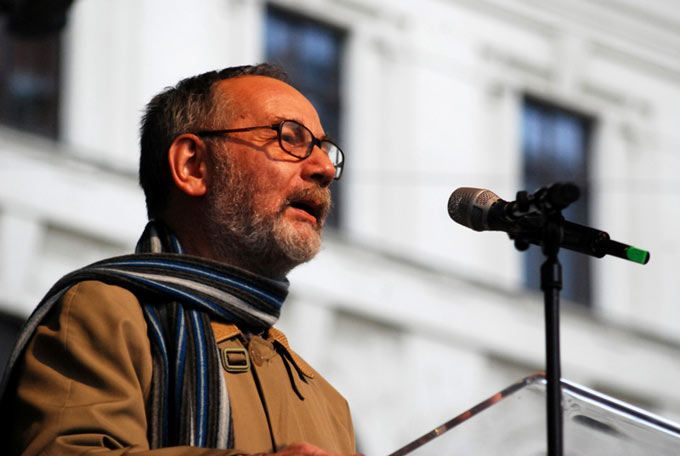
A protest against the fourth amendment to Hungary’s 2011 constitution on Alkotmány (“Constitution”) Street, in Budapest, March 9, 2013. Photo by Gabriella Csoszó.
Today is Revolution Day in Hungary, an annual celebration marking the Hungarian people’s 1848 uprising against the Hapsburg monarchy. Often observed with political demonstrations, this year’s holiday comes at a significant moment, only days after the country’s Parliament passed a constitutional amendment that many citizens consider a violation of Hungary’s democratic principles. The controversial law is only the latest in a series of major political overhauls pushed by Prime Minister Viktor Orbán. In 2011, his conservative Fidesz Party used its parliamentary supermajority to ratify a new constitution that has been criticized by the European Union and the United States for its eliminations of institutional checks and balances. To discuss the implications of Hungary’s new constitution, recent legislation and the broader political situation, artist and activist Gabriella Csoszó turned to Gábor Attila Tóth, a constitutional lawyer who is a founding member and, since January 2013, president of the Hungarian Civil Liberties Union.
—
Gabriella Csoszó: The Hungarian Civil Liberties Union (HCLU) has been a nonprofit human rights watchdog NGO since 1994. As one of the founders of the organization almost two decades ago, you have witnessed many social and political changes. How would you describe the present state of Hungary? In your opinion, what are the main issues and problems?
Gábor Attila Tóth: When we founded the HCLU, Hungary was a democratic state with a need for human rights watchdogs to remind it of its democratic principles. Today, Hungary is heading from democracy toward an authoritarian system of governance; at present it is halfway there. I don’t know what the end of the process will be, but I can see that our country is moving away from its democratic ideals.
Hungary’s move toward authoritarianism began with the 2010 elections, when then-opposition party Fidesz won 53 percent of the vote, which translated to two-thirds of the seats in Parliament because of our disproportionate system. This supermajority enabled Fidesz to rewrite the constitution, and the party misused this power. First, it changed the 1989 constitution ten times within a year. It attacked freedom of speech, curbed the Constitutional Court’s authority and captured the Electoral Commission, all by editing the old constitution.

Protesters gather on Alkotmány (“Constitution”) Street in Budapest, under the slogan, “The constitution is not a game,” March 9, 2013. Photo by Gabriella Csoszó.
In 2011, Fidesz ratified a new constitution, which went into effect on January 1, 2012. It also passed several “cardinal” laws, which can be seen as quasi-amendments to the constitution. These laws, which also require a supermajority to be approved, affect everything from the status of churches and independent media to tax regulation. They will jeopardize the ability of future coalitions to govern, because the next government is not likely to win the same supermajority. The constitution and the cardinal laws only serve the current governing coalition, led by Prime Minister Viktor Orbán, and they protect and promote Orbán’s political and ideological interests.
Our government doesn’t accept legal checks on its power and is trying to eliminate them altogether, step by step. I’m not even certain that the next elections will be free and fair.
GC: What is the HCLU’s role today? What legal means do you have to achieve your objectives when the Hungarian system has completely changed since the new constitution was passed? Do you have any avenues left to address human rights within the Hungarian legal environment, or do you have to resort to international forums?
GAT: From being a normal watchdog, we have taken up a more difficult position because we have to find our proper role within a semi-democratic, semi-authoritarian system. The HCLU continues its mission of protecting human rights, providing legal representation for those whose rights have been infringed, making recommendations on the formulation of new legislation and presenting its positions in front of the public. The HCLU has two main fields of activities. First, it defends fundamental rights and liberties, such as freedom of expression, freedom of religion and privacy. Second, it protects the rights of Hungary’s most vulnerable groups: Romas, LGBT citizens, people living with HIV/AIDS, psychiatric patients and drug users.
When nearly 300 churches were deprived of their legal status last year, the HCLU represented several churches not only in Hungarian legal procedures but also in front of the European Court of Human Rights. We prepare analyses and recommendations; we make them accessible to the Hungarian and international public, international institutions and our international human rights partner organizations. Most recently, we successfully persuaded the Council of Europe to examine the fourth amendment to the Fundamental Law of Hungary (as the 2011 constitution is known).

High school students protest against the fourth amendment to the constitution, with a banner that reads “There is only home where there is law,” and signs saying “Don’t betray us,” “Don’t betray yourself,” “Don’t betray the youth,” and “Don’t betray the Republic,” by Budapest’s Parliament, March 11, 2013. Photo by Gabriella Csoszó.
GC: The HCLU’s short description emphasizes the organization’s “independence.” Could you explain what makes you independent?
GAT: Independence means financial independence. Since the HCLU is an independent nonprofit organization, the financial resources are largely provided by foundations and, more often, by individuals. It does not accept governmental money. Independence also means that when criticizing the current government, HCLU does not do so in collaboration with the opposition, but from the point of view of an independent civil NGO. Our stances are not influenced by either the current government or the opposition.
GC: Since the problems you deal with are deeply political, how can you maintain independence?
GAT: Most HCLU positions are independent of ideological differences. For example, if the police use unlawful violence, the HCLU will take action. When the HCLU was founded, there was a left-wing government in power, and the organization criticized this administration in 2006, when police used disproportionate force to suppress the riots in Budapest. At present, there is a right-wing government, and the HCLU raises its objections based on the same principles. At the same time, there are certain issues where our point of view is undeniably far from the conservative approach, such as abortion, euthanasia or gay marriage.
GC: The HCLU has criticized the Fundamental Law of Hungary, while many scholars consider its fourth amendment anti-democratic but have argued that the country should accept the Fundamental Law and aim to improve it. Do you think that this new constitution provides legal support for an authoritarian form of government?
GAT: I would say that the demolition of constitutional democracy is a process that started with the amendments to the 1989 constitution—which was originally designed as an interim constitution amending the Stalinist constitution from 1949—and continued with the adoption of a new constitution, the so-called Fundamental Law of Hungary, in 2011. This constitution contains both democratic and severely anti-democratic elements. Its most recent modifications, known collectively as the fourth amendment, enhance its anti-democratic character.

Thousands protest against the fourth amendment of the constitution with banners that read “There is only home where there is law,” in a tunnel close to Budapest’s Chain Bridge, March 11, 2013. Photo by Gabriella Csoszó.
GC: What do you find most troublesome in the fourth amendment?
GAT: The new amendment is likely to have grave, worrying effects from at least three angles. First, it would violate the legal protection of fundamental human rights such freedom of expression, freedom of religion and equal treatment. The second is a more institutional problem: it would eliminate a system of checks and balances by again reducing the authority of the Constitutional Court. Third, it has ideological aims the HCLU has criticized, such as narrowing the notion of the family by excluding those who are childless or living in a same-sex partnership. This is totally unacceptable. When it comes to breaching civil liberties, eliminating checks and balances and instituting discriminatory laws, I would prefer not to rank: these are very serious problems, considered separately and taken together.
GC: HCLU members have delivered opinions and made speeches at important public demonstrations; the organization appears to have a mission to inform. Do you consider this mission an important aspect of the HCLU? Did the organization take part in the protests on March 9? Are you planning to be present on the events planned for March 15?
GAT: The HCLU was among the NGO organizers of the March 9 event against the proposed amendments to the constitution. One speaker presented the common position of three human rights organizations. March 15 will be different, as the events on this day of national celebration will mostly be organized by political parties. HCLU will not join with any party. Our task will be to ensure that everybody can exercise their civil liberties; either through legal support or amicus briefs, we will defend the rights to public assembly and to civil disobedience.

Philosopher Miklós Tamás Gáspár addresses a crowd of protesters in Budapest, March 9, 2003. Photo by Gabriella Csoszó.
GC: When, in 2010, the new government started to curb the Constitutional Court’s power, several political analysts predicted that the court would no longer function at all because of the changes. But in recent months, the court proved that it still has some legitimacy, by declaring several new laws unconstitutional. What do you think about this?
GAT: The Constitutional Court’s power has been restricted gradually, in several steps. The government has packed the court with its own members of Parliament and allies, and thus the court’s importance has been reduced. The court has barely exercised its ability to control the government since the 2010 elections. However, as you say, the court recently made some significant decisions, which protect the right to vote, put an end to penalties on the homeless and vindicate churches whose legal status was removed. The pessimistic critics you mention were proved to be overstating their case. This is why the government attacked again. The consequences of the fourth amendment will be to override most of the court’s decisions.
GC: What do you think about the climate in Hungary for the defense of human rights, our lives going forward and our confidence in the future?
GAT: Our prospects are not too good in the short term. Behind the constitutional problems, we are witnessing deep social and political crises, coming out of the last century’s tragedies. The rival parties do not accept one another; they believe the others are enemies. Right-wing politicians consider the left-wing parties Communists, and left-wing politicians consider the right-wing parties Fascists. They cannot work with one another when they are polarized like this. In addition, the nationalist Right believes that the European Union is the enemy of the Hungarian nation, just like the Soviet Union. I believe, however, that rival parties have a shared responsibility to cooperate in sustaining the constitutional arrangement that regulates fair political competition.
With poverty growing, we face a tragic fate; the young generation is leaving the country in large numbers; the life of Romas is more and more hopeless. But as the president of an organization committed to democratic values, I am optimistic in the long term. Our task is to show the constitutional and human rights solutions that would turn things in a better direction. It seems that this will be a long and bitter process.

Thousands of people protest against the fourth amendment of the constitution, Budapest, March 11, 2013. Photo by Gabriella Csoszó.
Translated by Lilla Szasz

